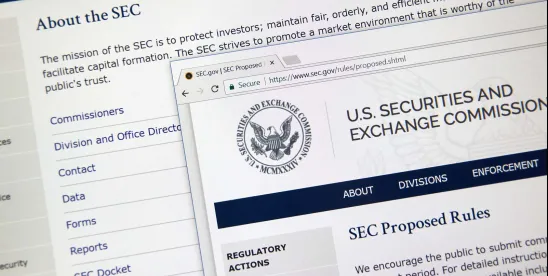On March 27, 2024, the SEC received a favorable—if at least somewhat split—decision when Judge Failla of the SDNY denied a motion by Defendants Coinbase, Inc. and Coinbase Global, Inc. (collectively, “Coinbase”) for judgment on the pleadings, seeking to dismiss the SEC’s case against it in SEC v. Coinbase, Inc. and Coinbase Global, Inc. Judge Failla denied the motion, in part, finding that the SEC sufficiently pled facts to show that transactions in at least some of the crypto assets identified in its Complaint are “investment contracts” and that Coinbase offers and sells its Staking Program as an investment contract under Howey. The decision also was not a total win for the SEC. The Court dismissed the SEC’s claims that Coinbase acted as an unregistered broker by making its Wallet application available to customers.
Roughly two months ago, we provided a 2024 update on recent precedent within the Southern District of New York (“SDNY”) concerning the U.S. Securities and Exchange Commission’s (“SEC”) ongoing enforcement activity against companies in the crypto asset space. In it, we previewed part of the SEC’s case against Coinbase and how it fit into our expectations for the SEC’s enforcement and regulatory priorities for the crypto asset market in 2024.
Background
The SEC first filed suit against Coinbase on June 6, 2023, alleging that Coinbase violated federal securities laws by operating as an unregistered exchange, broker, and clearing agency in connection with 13 specific crypto assets Coinbase offered on its platform. The SEC also alleged that Coinbase offered and sold crypto assets through Coinbase’s Staking Program without registering those offers and sales as securities in violation of the federal securities laws. The SEC’s case against Coinbase stands out from many of the SEC’s other crypto-related enforcement actions because it targets the largest US crypto exchange and secondary market for crypto assets.
In her decision, Judge Failla found that the SEC’s case on these issues can move forward because the allegations in the SEC’s Complaint “plausibly support[ed] the SEC’s claim that Coinbase operated as an unregistered intermediary of securities.” Concerning all the claims advanced by the SEC, the Court applied the frequently litigated analysis of whether these crypto asset transactions were “investment contracts” and thus “securities” under the longstanding precedent created by the United States Supreme Court inSEC v. WJ Howey Co., 328 U.S. 293 (1946). Under the Howey test, an investment contract exists where a person makes: (1) an investment of money; (2) in a common enterprise; (3) with a reasonable expectation of profits to be derived from the efforts of others. For certain crypto assets challenged by the SEC, the Court found that the SEC had sufficiently pled allegations that these assets constituted “investment contracts” under Howey’s three-prong analysis.
Bear in mind two different items. First, at the Rule 12(c) motion stage, the Court accepts all facts in the Complaint as true, draws all reasonable inferences in the SEC’s favor, and then determines whether the allegations plausibly give rise to an “entitlement of relief”; in short, the high burden made a victory for Coinbase at this stage challenging and unlikely. Second, the Court’s decision was limited only to the thirteen crypto assets at issue in the SEC’s case against Coinbase, and did not contain any broad, sweeping declarations about the crypto asset industry or the broader scope of the SEC’s enforcement authority in the space. This case, like the others that preceded it, rose and fell on the specific facts alleged by the SEC.
Discussion
- Transactions in Tokens as “Investment Contracts”
Thirteen crypto assets were at issue in the case, including: SOL, ADA, MATIC, FIL, SAND, AXS, CHZ, FLOW, ICP, NEAR, VGX, DASH, and NEXO (collectively, the “Crypto Assets”). To prevail on its claims, the SEC needed only to establish that at least one of these 13 Crypto Assets was being offered and sold as a security, and that Coinbase had intermediated transactions related therewith, such that transacting in that Crypto Asset amounted to operating an unregistered exchange, broker, or clearing agency. The Court focused on two of the 13 Crypto Assets at issue: SOL and CHZ.
Coinbase argued that judgment on the pleadings was appropriate because none of the transactions in the Crypto Assets identified by the SEC could qualify as an “investment contract,” and thus a “security” under the three-pronged Howey test.
Coinbase did not dispute that purchasers of Crypto Assets on Coinbase make an “investment of money”, so the Court only addressed whether the SEC pled sufficient allegations that met the second and third Howey prongs; namely, (2) that purchasers of Crypto Assets on the Coinbase Platform invested in a common enterprise and (3) that purchasers could reasonably expect profits derived solely from the efforts of others.
- Common Profit-Seeking Enterprise / “Horizontal Commonality”
To determine whether there is an existence of a common enterprise, the Court looked to whether the SEC’s allegations established “horizontal commonality,” otherwise understood as when investors’ assets are pooled and the fortunes of each investor are tied to the fortunes of other investors as well as to the success of the overall enterprise. Most notably, the Court’s decision suggested it believed that the tokens themselves hold no intrinsic value without the ecosystem in which they trade, and this fact ties investors’ fortunes to the overall crypto asset enterprise, not just the Crypto Asset itself.
The Court found that the SEC plausibly alleged horizontal commonality because token issuers, developers, and promoters frequently represented that they would pool proceeds from sales of these Crypto Assets to further develop the Assets’ ecosystems. The Court also noted the SEC established that Coinbase promised that these improvements would benefit all Crypto Asset holders simply by increasing the value of the Crypto Assets themselves. The Court found that under the SEC’s allegations, the profits from any Crypto Asset purchase were “dependent on both the successful launch of the token and the post-launch development and expansion of the token’s ecosystem.” Further, the Court explained that “[i]f the development of the token’s ecosystem were to stagnate, all purchasers of the token would be equally affected and lose their opportunity to profit.” The fact that investors’ profits or losses were tied to the crypto asset’s broader ecosystem itself satisfied Howey’s second prong.
Strikingly, the Court rejected Coinbase’s argument that the SEC could establish Howey’s second prong only by asserting investors expected profits in a common enterprise in the form of shares in income, profits, or assets of a business. By rejecting this limiting principle, the Court determined the SEC could establish Howey’s second prong by focusing more broadly on “the profits that investors seek on their investments, not the profits of the scheme in which they invest.” Instead, the SEC could establish horizontal commonality through “dividends, other periodic payments, or the increased value of the investment, not just income or profits. The latter category (increased value of the investment) is one that other courts have used to determine horizontal commonality exists under Howey. As this Court recognized, even when a crypto asset is “valueless,” a purchaser buys into the asset’s digital ecosystem, whose growth or contraction is necessarily tied to the value of the crypto asset itself. It is this “necessary” intermingling between crypto assets and their ecosystems that satisfies Howey’s horizontal commonality prong.
- Reasonable Expectation of Profits from the Efforts of Others
The Court also determined that the SEC adequately pleaded facts that satisfied Howey’s third prong, namely, that investors were led to believe they could earn a return on their investment solely by the efforts of others. The SEC alleged that issuers and promoters of the Crypto Assets repeatedly encouraged investors to purchase the Assets through various mediums (for example, websites, social media, and investor materials) by advertising the ways in which their technical and entrepreneurial efforts would be used to improve the value of the asset itself. Critically for the SEC, it alleged that these efforts by the Crypto Asset companies continued “long after the tokens were made available for trading in the secondary market,” a point Coinbase apparently conceded. These statements allegedly included publications that told investors in both the primary and secondary markets that profits from the continued sale of tokens “would be fed back into further development of the token’s ecosystem, which would, in turn, increase the value of the token.” Because of this, the Court determined that the SEC plausibly alleged that objective investors in both the primary and secondary markets could be led to believe that Coinbase promised the possibility of profits “solely derived from the efforts of others,” thereby satisfying Howey’s third prong.
Furthermore, the Court rejected Coinbase’s apparent distinction between investors that purchased Crypto Assets through initial coin offerings and those that later purchased through transactions on the secondary market, noting that “the applicability of the federal securities laws should not be—and indeed, as to more traditional securities, is not—limited to primary market transactions.” Coinbase tried to convince the Court that the market through which an investor purchased—primary versus secondary—impacted the “reasonable expectations” of that investor, and also that because secondary market transactions did not “involve the transfer of any contractual undertaking,” it could not meet the definition of “investment contract.”
Not so, according to the Court. Instead, investors “select[] an investment opportunity in either setting” based upon “the promises and offers made by issuers to the investing public” and make no distinction between the manner and market of sale. Thus, according to the Court, “the manner of sale has no impact on whether a reasonable individual would objectively view the [issuers’] actions and statements as evincing a promise of profits based on their efforts.” Here, the SEC alleged that Coinbase “publicly encouraged both institutional investors and investors trading in the secondary market to buy their tokens,” and did to through the rebroadcasting of white papers and other information that could impact a secondary market purchaser’s decision.
Moreover, the Court determined that the argument that transfers of crypto assets pursuant to written agreements in the primary markets and secondary sales without a formal contract was merely a “formalistic” distinction and contrary to the Howey decision and its lineage. For the Court, Coinbase’s argument ignored the fact that “since Howey, no court has adopted a contractual undertaking requirement.” Here, the Court relied on recent decisions from other SDNY courts like in Judge Jed Rakoff’s decision in SEC v. Terraform Labs Pte. Ltd., 2023 WL 8944860 (S.D.N.Y. Dec. 28, 2023) that also rejected requests to insert formalistic requirements for a contractual undertaking when determining whether a crypto asset sale meets the requirements of an “investment contract.”
"Taking this issue further, the Court rejected Coinbase’s argument that absent a formal contractual requirement, the “SEC could claim authority over essentially all investment activity.” For the Court, what separated Coinbase’s argument (where it argued that the authority the SEC sought could effectively allow it to regulate any investment where a customer “part[s] with capital in the hopes that her purchase ‘will increase in value’”) from the actual allegations here was Howey’s common enterprise/horizontal commonality prong. According to the Court, the existence of this prong necessarily limits the SEC’s enforcement authority to transactions where an investor purchases an asset tied to a common enterprise like the ecosystems of the tokens at issue. In the Court's view the Coinbase transactions were purchases “into the token’s digital ecosystem” and not just of the token itself. The Court reasoned that dependency on an ecosystem distinguished these token purchases from purchases of “commodities or collectibles” that could be “independently consumed or used.” According to the Court, crypto asset transactions like the ones in this case are “necessarily intermingled with [the issuer’s] digital network—a network without which no token can exist.” The Court therefore rejected Coinbase’s argument that the SEC’s position makes all investments securities and thus gives the SEC unbounded regulatory authority."
- Coinbase’s Staking Program as an “Investment Contract”
Separately, the Court also found that the SEC adequately alleged that Coinbase itself was the promoter of a Crypto Asset investment contract in violation of Section 5 of the Securities Act. The SEC alleged that the Staking Program offered by Coinbase, constituted an investment contract under Howey and must be registered under the Securities Act.
The Court rejected Coinbase’s argument that while the Staking Program involved a “common enterprise,” its participants were not investing money in Coinbase or its platform, and the profits that participants earned did not arise from the “efforts of others” because Coinbase’s efforts to generate returns were “ministerial” and not “managerial.”
Instead, the Court found that the Staking Program’s risk of loss was sufficient to establish that it met Howey’s first prong of an investment of money. For example, the SEC alleged that once a customer tendered its Crypto Assets to Coinbase and staked those Crypto Assets to the underlying blockchain protocol, those assets were at risk of being “slashed.”[1] Even though Coinbase never suffered a slashing event, the SEC sufficiently alleged that the existence of the risk of such an event (and therefore the risk of loss) was alone sufficient to merit an “investment of money.” The SEC also alleged that the staking procedure necessitated a loss of control in the investors’ Crypto Assets, as doing so locked those customers’ wallets into the platform and left the customers unable to trade or transact. For the Court, this loss of control enough to establish customers made an investment of money.
The Court also found that the SEC’s Complaint sufficiently alleged that Coinbase promised and undertook significant post-sale “managerial” efforts that in turn caused customers to reasonably expect profits from the efforts of others. Key facts the Court found persuasive included the fact that Coinbase: (1) retained third parties to stake participant assets; (2)deployed proprietary software and equipment; (3)maintained liquidity pools to allow for quicker participant withdrawals; (4) drew “stake” from pools of investor assets; (5) worked to increase the likelihood that a blockchain network will select Coinbase to validate transactions by pooling customer assets across multiple validator nodes; and (6) marshalled its technical expertise to operate and maintain nodes and stake customer assets in a manner that provided maximum server uptime, helped prevent malicious behavior or hacks, and protected keys to staked assets.
- Procedural Bars Do Not Apply
In addition to the substantive arguments, Judge Failla also rejected Coinbase’s other procedural arguments that claimed the Major Questions Doctrine, the Due Process Clause of the 5th and 14th Amendments, and/or the Administrative Procedure Act (the “APA”) prevented the SEC from alleging that the Crypto Assets at issue were “investment contracts”:
- The Court rejected application of the Major Questions Doctrine[2] because, while sizeable, “the crypto industry falls far short of being a portion of the American economy bearing vast economic and political significance.” Furthermore, the Court noted that the SEC acted within the regulatory authority Congress delegated to it by regulating “virtually any instrument that might be sold as an investment,” and rejected Coinbase’s argument that this was an improper expansion of its authority.
- The SEC did not violate the Due Process Clause given the following allegations: (1) Coinbase repeatedly touted to the investing public its familiarity with the relevant legal standards governing the offer and sale of securities; (2) it released the “Coinbase Crypto Asset Framework” asking issuers to provide information relevant to a Howey analysis; and (3) it founded, with others, the Crypto Rating Council which seeks to address whether an asset is a security under Howey.
- Finally, the Court found that the SEC was not promulgating new rules or a new regulatory policy and therefore, the APA does not apply.
- Key Win for Coinbase, Wallet Providers, and DeFi
The decision was not a complete loss for Coinbase or the larger industry. The Court granted judgment in favor of Coinbase on the SEC’s claim that Coinbase acts as an unregistered broker through its wallet service in violation of Section 15(a) of the Exchange Act. Specifically, the Court found that the SEC fell short in pleading facts that help establish that Coinbase acts as a “broker” by making a Wallet available to its customers.
Most notably, the Court ruled that “the fact that Coinbase has, at times, received a commission does not, on its own, turn Coinbase into a broker.” [Emphasis added.] This position arguably runs counter to the SEC’s position on the receipt of commissions and other transaction-based compensation in its guidance and other cases. The Court also found that while “Wallet helps users discover pricing on decentralized exchanges, providing pricing comparisons does not rise to the level of routing or making investment recommendations.” Even in combination, the Court found that these factors as pled did not mean that Coinbase undertook routing activities in a manner recognized by courts to have been traditionally carried out by brokers, such as by providing trading instructions to third parties or directing how trades should be executed.
Conclusion
Coming after Judge Jed Rakoff’s December 2023 decision which found that as a matter of law various crypto tokens sold by Terraform were “securities” under US securities laws, this case represents yet another decision by a SDNY judge that supports the SEC’s exercise of its regulatory and enforcement authority over the crypto assets industry.
The battle over who regulates crypto and how it is regulated will go on for years, and while this is largely a win for the SEC, it is merely a skirmish in a larger war. It must be emphasized that this decision in SEC v. Coinbase is a preliminary one that merely addressed the sufficiency of the SEC’s allegations at the pleading stage – it does not signify that the SEC proved its case against Coinbase. Indeed, Coinbase has already sought to appeal the Court’s decision to the Second Circuit Court of Appeals.
The decision is also based upon the particular crypto assets at issue and, like other decisions in this space, is highly dependent on the particular facts alleged. The Court made no broad or sweeping pronouncements regarding the crypto industry writ large, and in fact noted that had particular facts and allegations been different, so might the outcome. It remains true that the SEC’s enforcement actions will continue to rise and fall on the facts of the particular case, at least until Congress steps in and clarifies the scope of the SEC’s regulatory authority over the industry. Nevertheless, the Court rejected many of the same legal arguments the crypto asset industry has made in other cases that sought to rein in the SEC’s enforcement and regulatory authority over the industry.
[1] Slashing is a process whereby validators of proof-of-stake networks are penalized for acting dishonestly or behaving abnormally. It entails deducting a predetermined percentage from the validator’s staked cryptocurrency.
[2] The Major Questions Doctrine requires any agency action seeking to decide an issue of major national significance, to be supported by clear congressional authorization.









 />i
/>i

